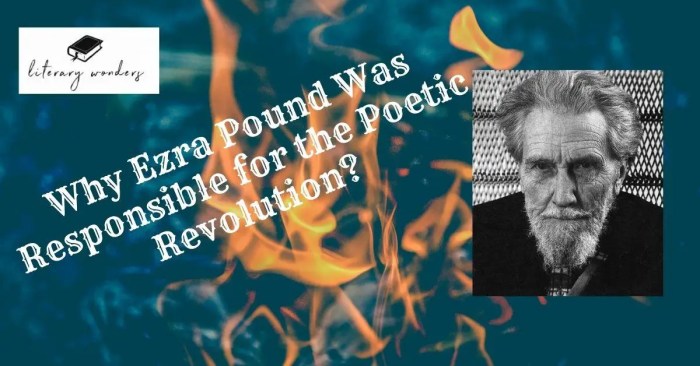A Retrospect by Ezra Pound, a seminal work in the modernist literary canon, invites readers to embark on a profound journey through the mind of a literary titan. This essay delves into the complexities of Pound’s magnum opus, exploring its themes, structure, and historical context.
Pound, a pivotal figure in the modernist movement, crafted A Retrospect as a reflection on his life and work. The poem’s intricate structure and evocative language offer a glimpse into the poet’s inner struggles and his unique perspective on the world.
Biographical Context of Ezra Pound: A Retrospect By Ezra Pound
Ezra Weston Loomis Pound was born in Hailey, Idaho, on October 30, 1885. His father was a lawyer, and his mother was a musician. Pound showed an early interest in literature and began writing poetry as a child. He attended the University of Pennsylvania and Hamilton College, but did not graduate from either institution.
In 1908, Pound moved to London, where he quickly became involved in the modernist movement. He was a close friend and collaborator of T.S. Eliot, and his work was published in some of the most important literary magazines of the time, including The Egoistand The Criterion.
Influences
Pound was influenced by a wide range of poets, including the Romantics, the French Symbolists, and the Imagists. He was also a great admirer of Dante, and his work is often characterized by its use of allusion and myth.
Role in the Modernist Movement
Pound was one of the most important figures in the modernist movement. He helped to shape the movement’s aesthetics and its commitment to experimentation. He was also a tireless promoter of other modernist writers, and his work helped to bring their work to a wider audience.
Overview of “A Retrospect”
Ezra Pound’s “A Retrospect” is a deeply personal and introspective poem that reflects on the poet’s life and artistic journey. It explores themes of loss, regret, and the search for meaning in a chaotic and fragmented world.
The poem is structured as a series of vignettes and fragments, each capturing a moment or experience from Pound’s past. The language is spare and evocative, using vivid imagery and symbolism to convey the poet’s emotions and thoughts.
Use of Language and Imagery
Pound’s use of language in “A Retrospect” is highly evocative and allusive. He employs a wide range of literary devices, including metaphor, simile, and personification, to create a rich and multilayered poetic texture.
The poem’s imagery is often drawn from nature, particularly the sea and the landscape. These images serve as symbols for the poet’s inner life, reflecting his feelings of isolation, longing, and despair.
Analysis of Key Passages

Ezra Pound’s “A Retrospect” is a complex and multi-layered work, rich with allusions, symbols, and metaphors. By examining key passages, we can gain a deeper understanding of Pound’s ideas and the impact he intended to create.
One significant passage occurs in the opening lines:
I have tried to write Paradise
Do not move
Let the wind speak
Here, Pound sets the tone for the poem as a search for a lost paradise. He implores the reader to remain still and listen to the voice of the wind, a symbol of nature and inspiration.
Symbolism of the Wind
The wind is a recurring symbol throughout the poem, representing both destruction and creation. It is a force that can tear down and scatter, yet it also carries the seeds of new life. In this passage, the wind speaks to Pound, offering him guidance and inspiration in his quest for paradise.
Allusions to Dante
Pound’s use of allusions to Dante’s Divine Comedyis evident in the line “Do not move.” This echoes Dante’s encounter with the three beasts in the Inferno, where he is instructed to “not move.” By invoking this allusion, Pound suggests that his own journey is a similar quest for enlightenment and salvation.
Metaphor of the Tree, A retrospect by ezra pound
Another key passage appears later in the poem:
A tree is a focus
A point of reference
And a point of growth
Ezra Pound’s retrospectives offer invaluable insights into his literary journey. However, if you’re looking for a shortcut to academic success, you might want to consider consulting li le final exam answers . While Pound’s reflections are certainly worth exploring, remember that true understanding comes from engaging with the source material and developing your own critical perspectives.
Here, Pound uses the metaphor of the tree to represent the individual’s potential for growth and transformation. The tree is a stable and rooted presence, providing a sense of stability and direction. It also symbolizes the individual’s capacity for growth and renewal, as it reaches towards the sky.
Historical and Cultural Context

Ezra Pound’s “A Retrospect” was written during a period of significant historical and cultural upheaval. World War I had just ended, leaving Europe in ruins and its social and political order in flux. The rise of fascism in Italy and Germany posed a new threat to democracy and individual liberty.
In the literary world, modernism was gaining ground, challenging traditional forms and conventions.
World War I
The horrors of World War I had a profound impact on Pound. He witnessed the destruction of Europe’s cultural heritage and the loss of countless lives. The war also shattered his faith in the old order and led him to question the values of Western civilization.
Rise of Fascism
The rise of fascism in Italy and Germany further disillusioned Pound. He saw fascism as a dangerous ideology that threatened to destroy the very fabric of society. Pound’s opposition to fascism is evident in “A Retrospect,” where he warns against the dangers of tyranny and the suppression of free thought.
Changing Literary Landscape
The literary landscape was also changing rapidly during this period. Modernism was challenging traditional forms and conventions, and Pound was at the forefront of this movement. In “A Retrospect,” he reflects on the changing nature of literature and argues for the importance of experimentation and innovation.
Critical Reception and Legacy

Upon its publication, “A Retrospect” received mixed critical reception. Some critics praised Pound’s technical brilliance and innovative use of language, while others found the poem’s dense and fragmented style challenging.
Despite the initial mixed reception, “A Retrospect” has had a lasting impact on modern poetry. Its experimental form and exploration of personal and historical themes have influenced generations of poets. The poem is considered a key work in Pound’s literary career, marking a significant shift in his poetic style and themes.
Pound’s Literary Career
Pound’s early poetry was characterized by its Imagist aesthetic, which emphasized precision and clarity of language. However, in “A Retrospect,” Pound moved away from this style, embracing a more experimental and fragmented approach. This shift reflected his growing interest in modernism and his desire to explore the complexities of human experience.
“A Retrospect” is often seen as a transitional work in Pound’s career, bridging the gap between his early Imagist poetry and his later, more experimental works such as The Cantos. The poem’s fragmented structure and juxtaposition of personal and historical elements foreshadowed the themes and techniques that Pound would develop in his later work.
Commonly Asked Questions
What is the main theme of A Retrospect?
A Retrospect explores themes of memory, loss, and the search for meaning in a rapidly changing world.
How does Pound use language in A Retrospect?
Pound’s use of language in A Retrospect is innovative and experimental, characterized by fragmented syntax, multiple voices, and allusions to various cultures and historical periods.
What is the historical context of A Retrospect?
A Retrospect was written during a period of great social and political upheaval, including World War I and the rise of fascism, which influenced Pound’s disillusionment and sense of loss.